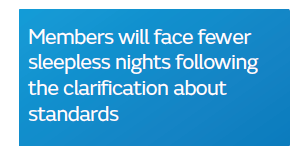Stephen Henderson describes a campaign that has fundamentally changed the way in which the GDC’s Investigating Committee operates
Dental members may not always be aware of the amount of time that is spent behind the scenes, working with the GDC to effect change for the better. By providing you with a little more detail, you can see for yourself the benefits to the membership as a whole.
Who knew?
In the aftermath of all the less glorious events at the GDC over the past year, and the relentless adverse publicity they have attracted, the recent change in the operation of the GDC’s Investigating Committee has gone largely unnoticed and in fairness to the GDC, this stormy background has eclipsed much of the good work it has been doing in this regard. Although the result has had little recognition, it has, in fact, taken several years of persistent dialogue and private campaigning for the rights of all registrants to be protected, without compromising the interests or safety of the public in any way.
The GDC is exceptionally keen to engage with key stakeholders when they are reviewing operational processes, developing new guidelines and policy.These interactions can range from informal meetings, at the earliest stages to a full scale public consultation. You can find all our own consultation responses under the publications tab on the Dental Protection website.
If the Fitness to Practise procedure (FTP) is working fairly and proportionately, we could expect decisions to be reasonable, just and promptly delivered.
Behind the scenes
Dental Protection has regularly engaged in formal and informal stakeholder liaison with the GDC on behalf of all the UK dental members. Most readers will be aware of the robust response that Dental Protection submitted in response to the ARF debate (http://ow.ly/P1HXJ) which set out many concerns about the FTP process. Behind the scenes, Dental Protection and other key stakeholders including the BDA have been campaigning for a major change in the way that the Investigating Committee(IC) carried out its work.
Getting the test right
Dental Protection has had a concern that, for years, the IC was not applying the correct legal test when considering a case, with the result that far too many registrants were being referred forward for further investigations and a hearing. This has been raised in private meetings with the GDC on numerous occasions over the years. And we have warmly welcomed the fact that the Faculty of General Dental Practice has supported our views on this by providing access to their guidance standards on line, publicly sharing our stated concern that the FGDP standards were often being quoted and applied out of the context for which they were intended. FGDP has helpfully clarified their proper interpretation.
The fact that the incorrect legal test has too often been applied is evidenced by the higher than expected number of cases that are closed after the investigation, without a hearing. Far too many cases were referred forwards for a hearing only for the GDC’s case not to be made out and the respondent’s fitness to practise found, not to be impaired. This begs the question of whether a hearing was ever really necessary in all of these cases.
Follow up
The next stakeholder event was to be an invitation to the new IC panellists training day in March 2015. In January 2015 the defence organisations met again to agree the nature of the presentation that we planned including (amongst other things) why we thought the panel was applying the wrong test.
It came as a pleasant surprise to find that the day before the training event, new IC guidance had been issued, which clearly set out the legal test to be applied by the panel. The delegates to the training event were, at last, on the same page by the time we arrived.
Clarification
The legal test is that the IC has to determine whether the facts alleged are likely to be proved, on the balance of probability. This requires a finding that something is (however narrowly) more likely to be true than not true.
If the facts are likely to be proved the next question is whether or not these facts could or would amount to ‘‘misconduct’’. This means a departure from an accepted standard of professional conduct/ behaviour/practice which is on a serious (as opposed to a minor or moderate) scale.
The consequence of this clarification to the IC is that fewer cases will now be referred for a hearing. This will result in many fewer sleepless nights for members facing the threat of public sanction, suspension or erasure. It will, in the long term, result in a lower expenditure on defending cases that should never have been referred in the first place. This will inevitably have an impact on future subscription levels, once the current logjam of cases is behind us.
Standards

the In addition to our private representations and lobbying,BDJ* published an article by the Dental Director Kevin Lewis, making the case that the profession was increasingly being judged – in courts of law, by the GDC and elsewhere – against inappropriate and excessively testing standards. Many published standards from a variety of sources are ‘‘aspirational” in nature and were never written with the intention that they should be interpreted as the bare minimum acceptable standard to be achieved. We argued that it is more likely that you will be found to have performed below an acceptable standard, if the “bar” of acceptability has been set in the wrong place to start with – as we believe it has.
*Professional standards and their escalating impact upon the dental profession; Lewis, K; BDJ 2015; 218: 381-383
« New judgment on patient consent
New standards for conscious sedation 2015 »